(!)NOTE : Windows 7 users won’t be able to use some latest features of eCatalog/WOS since Microsoft is ending support for Windows 7 on 14 Jan, 2020. Please upgrade your system for uninterrupted services.
- Notice of End of Sales for Economy Series Pneumatic Equipment Category. More information.
MISUMI Single Axis Robots(Max. Thrust Force Range:201~300)
Brand |
|
|---|---|
| CAD |
|
| Days to Ship |
|
1 items
- Sort By
-
You can add up to 6 items per a category to the compare list.
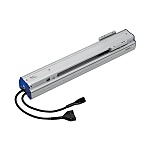

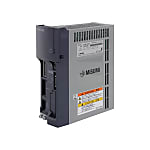
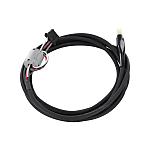
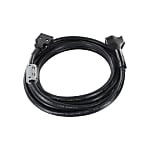
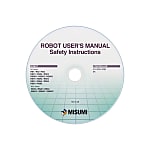
Single Axis Robot RSH1 - Straight
MISUMI
"Maximum Load Capacity: 40kg (Horizontal) / 8kg (Vertical), Stroke: 150~800mm, Max. Velocity: 1200mm/sec"
Stroke(mm) Type Max. Transportable Mass Range (Horizontal)(kg) Max. Transportable Mass (Horizontal)(kg) Max. Transportable Mass Range (Vertical)(kg) Drive Method Max. Transportable Mass (Vertical)(kg) Main Body, Peripheral Components Lead(mm) Guide Input Power Supply Position Detection I/O Module Max. Thrust Force Range(N) Table Length L1(mm) Positioning Repeatability(µm) Maximum Velocity(mm/sec) Table Width W1(mm) Brake Operating Environment Max. Thrust Force(N) Noise Filter 150 ~ 800 Slider 20.1~50.0 40 5.1~10.0 Rolled Ball Screw 8 Main Body 6 - AC Single-Phase, 100 ~ 115V ~ AC Single-Phase, 200 ~ 230V Incremental / Absolute NPN / PNP / CC-Link / DeviceNet 201~300 78 ±20 360 80 Not Provided / Provided Standard 283 Not Provided / Provided Days to Ship: 20 Day(s) or more  20 Day(s) or more
20 Day(s) or more
| Brand |
|---|
| Product Series |
| CAD |
| From |
| Days to Ship |
| Stroke(mm) |
| Type |
| Max. Transportable Mass Range (Horizontal)(kg) |
| Max. Transportable Mass (Horizontal)(kg) |
| Max. Transportable Mass Range (Vertical)(kg) |
| Drive Method |
| Max. Transportable Mass (Vertical)(kg) |
| Main Body, Peripheral Components |
| Lead(mm) |
| Guide |
| Input Power Supply |
| Position Detection |
| I/O Module |
| Max. Thrust Force Range(N) |
| Table Length L1(mm) |
| Positioning Repeatability(µm) |
| Maximum Velocity(mm/sec) |
| Table Width W1(mm) |
| Brake |
| Operating Environment |
| Max. Thrust Force(N) |
| Noise Filter |
You can add up to 6 items per a category to the compare list. | |
| Brand | MISUMI |
| Product Series | |
| CAD |
|
| From | - |
| Days to Ship | 20 Day(s) or more |
| Stroke(mm) | 150 ~ 800 |
| Type | Slider |
| Max. Transportable Mass Range (Horizontal)(kg) | 20.1~50.0 |
| Max. Transportable Mass (Horizontal)(kg) | 40 |
| Max. Transportable Mass Range (Vertical)(kg) | 5.1~10.0 |
| Drive Method | Rolled Ball Screw |
| Max. Transportable Mass (Vertical)(kg) | 8 |
| Main Body, Peripheral Components | Main Body |
| Lead(mm) | 6 |
| Guide | - |
| Input Power Supply | AC Single-Phase, 100 ~ 115V ~ AC Single-Phase, 200 ~ 230V |
| Position Detection | Incremental / Absolute |
| I/O Module | NPN / PNP / CC-Link / DeviceNet |
| Max. Thrust Force Range(N) | 201~300 |
| Table Length L1(mm) | 78 |
| Positioning Repeatability(µm) | ±20 |
| Maximum Velocity(mm/sec) | 360 |
| Table Width W1(mm) | 80 |
| Brake | Not Provided / Provided |
| Operating Environment | Standard |
| Max. Thrust Force(N) | 283 |
| Noise Filter | Not Provided / Provided |
Loading...
Configure
Specification/Dimensions
-
Stroke(mm)
-
Type
-
 Slider
Slider -
 Rod
Rod -
 Rotary Shaft
Rotary Shaft
-
-
Max. Transportable Mass Range (Horizontal)(kg)
- 0~2.0
- 2.1~5.0
- 5.1~10.0
- 10.1~20.0
- 20.1~50.0
- 50.1~100.0
The calculation method differs depending on the manufacturer. For details, see the technical data provided by the relevant manufacturer.
-
Max. Transportable Mass (Horizontal)(kg)
The calculation method differs depending on the manufacturer. For details, see the technical data provided by the relevant manufacturer.
-
Max. Transportable Mass Range (Vertical)(kg)
- 0~2.0
- 2.1~5.0
- 5.1~10.0
- 10.1~20.0
- 20.1~50.0
The calculation method differs depending on the manufacturer. For details, see the technical data provided by the relevant manufacturer.
-
Drive Method
-
Max. Transportable Mass (Vertical)(kg)
The calculation method differs depending on the manufacturer. For details, see the technical data provided by the relevant manufacturer.
-
Main Body, Peripheral Components
- Main Body
- Peripheral Components
-
Lead(mm)
-
Guide
-
Input Power Supply
-
Position Detection
-
I/O Module
- NPN
- PNP
- CC-Link
- DeviceNet
- Not Provided
- INPOS Signal
-
Max. Thrust Force Range(N)
-
Table Length L1(mm)
-
Positioning Repeatability(µm)
-
Maximum Velocity(mm/sec)
-
Table Width W1(mm)
-
Brake
-
Operating Environment
-
Max. Thrust Force(N)
-
Noise Filter
Narrow search by specifying Manufacturer
Related Categories to Single Axis Robots
FAQ Single Axis Robots
- Question: What is a single axis robot and what are its primary uses in industry?
- Answer: A single axis robot is a robotic system designed to move along a single linear or rotational axis. Its primary use in industry is to automate tasks that involve simple linear movements, such as pick-and-place operations, material handling, and assembly processes.
- Question: How does a single axis robotic arm enhance production efficiency?
- Answer: A single axis robotic arm enhances production efficiency by automating repetitive tasks with precision and speed. It eliminates the need for manual labor in tasks that involve linear movements, leading to increased throughput, reduced cycle times, and improved overall process efficiency.
- Question: What factors should I consider when choosing a single axis robot for my operation?
- Answer: When choosing a single axis robot, consider factors such as payload capacity, speed, accuracy, and the specific requirements of your application. Additionally, evaluate the ease of integration to the system, compatibility with control systems, and the overall cost of ownership.
- Question: Can single axis robots be integrated with multi-axis systems?
- Answer: single axis robots can be integrated into multi-axis systems to create more complex and versatile robotic solutions. Combining single axis and multi-axis robots allows for a broader range of motion and the ability to handle intricate tasks in manufacturing and automation.
- Question: What are the benefits of using single axis robots in a cleanroom environment?
- Answer: single axis robots are advantageous in cleanroom environments due to their sealed and compact designs, minimizing the risk of contamination. Their precision and reliability make them suitable for tasks like semiconductor manufacturing, electronics assembly, and medical device production that demand a controlled and sterile environment.
- Question: How do single axis robots contribute to safety and ergonomics in the workplace?
- Answer: single axis robots contribute to workplace safety by taking over repetitive and potentially hazardous tasks, reducing the risk of injuries to human workers. Moreover, they enhance ergonomics by handling heavy loads and performing tasks in confined spaces, creating a safer and more comfortable working environment.





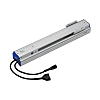













How can we improve?
How can we improve?
Thank you for your time.
Your feedback is essential for our continuous improvement
Privacy Policy
Thank you for your cooperation.
Thank you for your time.
Your feedback is essential for our continuous improvement
Please use the inquiry form.
Privacy Policy